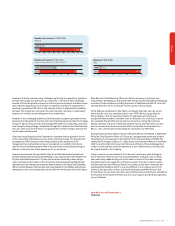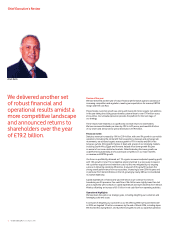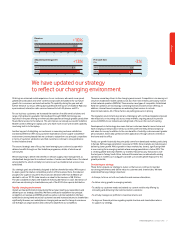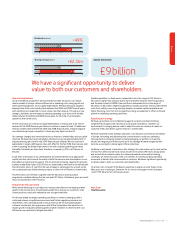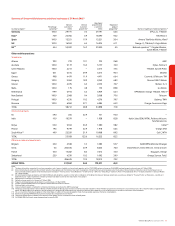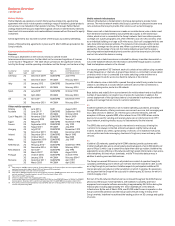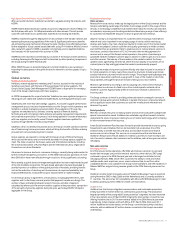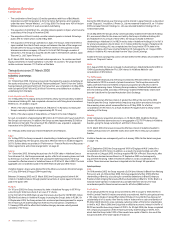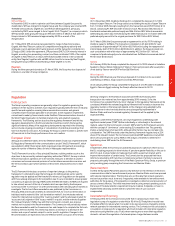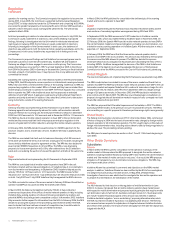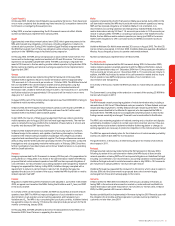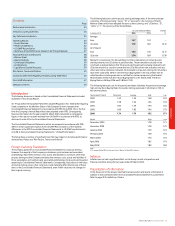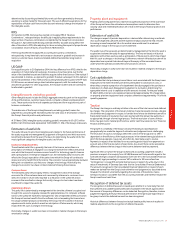Vodafone 2006 Annual Report Download - page 19
Download and view the complete annual report
Please find page 19 of the 2006 Vodafone annual report below. You can navigate through the pages in the report by either clicking on the pages listed below, or by using the keyword search tool below to find specific information within the annual report.
Vodafone Group Plc Annual Report 2006 17
saving was determined by calculating the expected cost per minute for all Vodafone’s
European customers who roam within the EU during the month of April 2007 and
comparing this to the average cost per minute for all European customers who roamed
within the EU during the period from June to August 2005 (see “Regulation”).
Vodafone also announced that it will enter into reciprocal wholesale arrangements with
any other European operator at no more than 45 eurocents per minute for voice calls
within the EU from October 2006. This will enable both Vodafone and other European
mobile operators to continue to lower the cost of roaming to customers outside of their
own networks.
Vodafone Passport
Vodafone Passport introduced a new roaming pricing architecture for calls made on
Vodafone and Partner Networks, enabling customers to “take their home tariff abroad”.
The Vodafone Passport price architecture offers greater price transparency and certainty
to customers when using roaming services abroad. Whilst abroad, customers can make
calls using their domestic tariff, in some cases including free minute bundles, and
receive calls at no charge – for a one-off connection fee per call.
Vodafone Passport is now available in 10 controlled markets, one joint venture market,
one associated company market and one Partner Market. By 31 March 2006, the service
had attracted 5.6 million customers in the Group’s controlled and jointly controlled
operations and a further 0.4 million customers in one of the Group’s associated
undertakings and a Partner Market. Results show that on average, customers are both
talking more and paying less per call when abroad. In addition, Vodafone’s cost per
minute for roaming customers fell by over 30% from summer 2004 compared with
summer 2005.
Wholesale strategy
During the year, the commercial management of the Group’s business with its main
roaming partners has been consolidated in order to better leverage the scale and scope
of the Group’s branded footprint. This arrangement has successfully secured a number
of important wholesale roaming discount agreements with other networks on behalf of
the Group. These provide cost structures that support the development of our roaming
customer propositions, promote the mutual development of roaming services with our
Partner Markets, and deliver significant cost savings.
Managed roaming, the network technology that automatically directs Vodafone
customers to the networks of Partner Markets, is now operating in ten markets,
delivering a strong Vodafone customer experience and allowing the Group to benefit
from an improved cost structure.
Data propositions
Several actions were taken to complement Vodafone Passport by providing simplicity,
price predictability and value for money across data services. Vodafone Group took the
initiative to reduce substantially – up to 66% in some markets – the cost per megabyte
for standard data usage across its controlled markets. This move was followed by most
joint ventures, associated companies and Partner Markets, enabling customers to
benefit from a conveniently priced data platform across a wide footprint of 30 markets.
In addition, after pioneering flat monthly data roaming tariffs with its BlackBerry from
Vodafone offer in 2004, Vodafone launched a monthly bundle for its Vodafone Mobile
Connect 3G/GPRS data card in August 2005, which eliminated price uncertainty and
further reduced the nominal cost per megabyte by over 80%. This has significantly
increased usage and contributed to the revenue growth in data services seen over the
2006 financial year.
Vodafone Simply
The Vodafone Simply proposition, launched in May 2005, is predominantly targeted at
the adult personal user segment. The integrated proposition has been developed to
help customers who are less comfortable with mobile technology but would still like to
access the mobile experience. The proposition includes exclusively developed, ‘easy to
use’ mobile phones with uniquely developed user interfaces accompanied with tariff
plans and a tailored retail and customer support experience.
At 31 March 2006, Vodafone Simply was available in a total of 17 markets, with 0.4
million Vodafone Simply enabled devices registered on the Group’s controlled and
jointly controlled networks.
Marketing and brand
Brand
Brand marketing focuses on defining a superior, consistent and differentiated experience
for our customers. A programme has been undertaken to identify the heart of the
Vodafone brand, that is, Vodafone’s brand essence – which evokes passion,
dependability and a constant striving for improvement. The brand essence has been
used to bring the Vodafone brand to life for Vodafone employees, so that they can do
the same for customers in every interaction.
Customer communications
Communication to drive brand preference and service usage is facilitated through
various integrated advertising media including radio, television, print and outdoor sites.
Global advertising has been developed to communicate the brand essence and to drive
revenue growth by encouraging our customers to ‘make the most of Now’. Advertising is
supported by strong sponsorship relationships, such as those with Ferrari and the UEFA
Champions League, which have global exposure and allow for benefits to be realised at
the local level. Media activity is based on customer insight, and is designed to ensure a
consistent and effective brand experience across Vodafone’s footprint.
Customer strategy and management
Vodafone uses a customer management system called ‘customer delight’ to measure
customer satisfaction in the Group’s controlled markets and the jointly controlled
market in Italy at a local and global level. This is a proprietary diagnostic system which
tracks customer satisfaction across all the points of interaction with Vodafone, and
identifies the drivers of customer delight and their relative impact. This information is
used to optimise satisfaction and maximise the financial benefit from differentiated
marketing propositions and programmes.
Distribution
The Group distributes its products and services through a wide variety of direct and
indirect channels, with different approaches used in the consumer and business sectors.
Products and services are available directly to both consumer and business customers in
the majority of markets. Over 1,000 stores are directly owned and managed by
Vodafone, with an additional 6,500 Vodafone branded stores. In addition, local websites
offer products and services online and local sales forces are in place to discuss terms
with business customers.
The extent of indirect distribution varies between markets but may include using third
party service providers, independent dealers, agencies and mass marketing. Marketing
to third party service providers includes maintaining a competitive tariff structure,
providing technical and other training to their staff and providing financial incentives for
service providers, their dealers and sales people. It also entails providing assistance on
advertising campaigns and supporting the development of both specialist retail outlets
and programmes with multiple retailers.
Vodafone’s engagement with IT resellers and distributors has strengthened during the
year, with global and local partnerships now fully operational in 12 countries across the
Vodafone footprint. In support of this channel capability, Vodafone has launched a
channel marketing programme to engage with the IT reseller community via the
internet. The programme allows Vodafone marketing and communication access to the
IT channel and incentivisation for the sale of Vodafone data products. The programme is
operational in eight controlled markets and will be extended across the rest of the
Vodafone footprint during the 2007 financial year. This engagement with the IT channel
considerably extends Vodafone’s ability to sell to small and medium enterprises and
small business customers as well as providing a key platform to support the launch of
notebooks with built in 3G broadband during the coming year.
The last few years have seen the growth of MVNOs who buy access to existing networks
and re-sell them to customers under a different brand name and proposition. Where
such a relationship generates profitable use of network capacity and does not impact
the Vodafone brand, a mobile operating subsidiary may consider entering into a
partnership with an MVNO.
Multinational corporates (“MNC”)
In April 2005, Vodafone launched the first global business unit aimed at serving a
specific customer segment – the multinational corporate market. The MNC business
unit currently serves many of the world’s largest enterprises with a differentiated global
MNC proposition. The sales and service teams are located across the globe, aligned with
the customers’ locations. Customers of the business unit also benefit from a central
service unit to develop specific propositions and pricing specifically targeted to meet
the needs of a global Chief Information Officer, helping to purchase, manage, monitor
and administer mobile telecommunications centrally within a global organisation.
The Vodafone MNC unit’s initial focus is on providing consistency across Vodafone
markets for existing corporate solutions, together with dedicated global customer
service and global account management. The MNC vision is “worldwide
communications made easy for global businesses”. In the year since launch, the
Vodafone MNC unit can offer a consistent BlackBerry from Vodafone solution in 12
markets, a Master Service Agreement covering nine countries, a global helpdesk offering
third line support to the administrator of the global accounts, account and service
management at a global and local level in over 20 markets with full support from a
technical team to implement existing solutions, and help develop tailored solutions.
Business


